I'm worried about your move into Romania, I fear that it won't be a defensible position for the inevitable war against the imperialists (and if it wasn't guarenteed I'd have say that war against Iran would have been a better choice but who am I to question Stalin's policies?)
Tukhachevsky's Army and the Politburo (Interactive TFH 4.02) -- Update thread
- Thread starter Avindian
- Start date
-
We have updated our Community Code of Conduct. Please read through the new rules for the forum that are an integral part of Paradox Interactive’s User Agreement.
You are using an out of date browser. It may not display this or other websites correctly.
You should upgrade or use an alternative browser.
You should upgrade or use an alternative browser.
The Secret Life of Comrade Zverev
Zverez walked out of the empty Politburo Office, which of recent months have been empty of all but himself, Comrade Stalin and Vatutin while Yakushev and Alkinis made odd appearances. It was a rather shame, since the SGO was now active and the wars on the Continent beginning, but it is as it is.
After putting on his thick fur coat, he stepped out into a snowy, blowy Moscow day. He thought of his recent success as he walked to his favourite tea lounge, reserved for upper Politburo members only, to meet some of his friends. He thought how in the last 2 years he has risen in the ranks from a lowly Deputy Chairman of Moscow to the second most senior member of the SGO, Kommissar of Defense and Acting Kommissar of Finance. It was a truly great day today, Hrynko would be proud.
Reaching the lounge (named rather cleverly the Chaynarodnoy Partii or "People's Tea Party") he was nodded in by the guard and walked straight to his traditional table. There he saw Borys Melnyk, the newest Deputy Kommissar of the Ukrainian Soviet Socialist Republic, Toktar Munaytpasov, an old Deputy Kommissar of Defense for the Kazakh Soviet Socialist Republic and Pavel Leonidovich Korovin, his replacement as Deputy Chairman of the City of Moscow.
Zverev: Hello my friends, I am glad to see you all. We must drink to finally being able to speak together in public again. It has been far too long.
Toktar: Aye Comrade, now that Goda is dead, the members of the Defense Ministry can breathe freely.
Borys: And the Finance Ministry, though it is a shame about Hrynko. He was a headstrong and arrogant man, but stood up for what he thought for, which was the Revolution and the rights of the bureaucratic gear of state.
Pavel: Smelled like pickled eggs though. At least that damn butcher is dead. Cheers!
Clinking of glasses and extensive small talk over each respective office and over their personal lives.
T: So Zev, what now? You are in de jure control of two ministries, belong to the SGO and as yet are highly quiet and unknown. What is this? I have yet to even hear you referenced in the Red Star. Speaking of which, I am glad Grossman didn't die, he is a great writer. It'd have been a crime to the revolution if Grossman was purged during the last burst of insanity by Goda.
Z: Yes, I agree. And the key to success, at least for me, is to be quietly efficient. Hrynko had his mouth too wide too much. He walked right into confrontation with the NKVD. Simply be efficient and be quiet and lots may happen. As for what now, I guess just make sure I do not screw up. The bureaucrats of this nation are properly being represented, finally. For too long either the NKVD or Military did the talking for us.
B: We need to do this again sometime. One last cheers to Comrade Hrynko, our friend and comrade, a true Leninist and our mentor.
Clinking again. All the individuals get up to leave to their respective offices.
Walking back to Red Square, Zverev smiled. With Yagoda dead, the Military firmly in charge of state affairs and the secret service broken, the unknowns that are the bureaucrats may finally work in peace.
Steeling his face again for the true terror that was the Politburo, Zverev re-entered the conference room, files in hand and ready to address any and all issues related to both the Kommissariates of Defense and Finance.
((I wanted to add my own story for Zverev, since his naturally quiet and efficient demeanour means that he does not get much IC))
Chapter 10: The Straits are ours!
1 November 1939, home of Anastasia Petrova, Moscow
Comrades Petrova and Sokolov beamed at their little Stanislav. As a true proletarian, Petrova elected to keep her maiden name rather than take her husband’s. The story even featured prominently in an issue of Moskovskaya Pravda. Thus, when they heard the knock on the door of their apartment, they assumed it was yet another well-wisher.
It was a well-wisher, but no ordinary well-wisher.
Anastasia could not hide her surprise. “Comrade Stalin! How kind of you to pay us a visit?”
Stalin picked up little Stanislav and smiled with genuine warmth. “A fine young Communist you have here, Anastasia Ivanova! I remember when Yasha was that age.”
Sokolov ventured a question: “How is Major Dzhugashvili these days?”
A little of Stalin’s warmth dissipated. “Your guess is as good as mine. I fear his rank has gone to his head; he is probably holding court right now in some bar, like a Tsarevich of old!” He clucked his tongue. “Anastasia Ivanova, I must borrow Feodor Vasilievich.”
Anastasia nodded her assent, and the two men adjourned to the study. Once the door was closed, Stalin turned to Sokolov, lighting his pipe. “Feodor Vasilievich, we have a problem.”
Sokolov kept his face neutral. “What problem is that, Comrade Stalin?”
Stalin took a few puffs, and then set down the pipe. “You know that my Vasily has gone to join the Air Force, yes?”
“I do, Comrade.”
“Good. My son wishes to be a bomber pilot, to follow his brother into glory. Of course, I approve. It is good for a boy to become a man, I think, in the crucible of war. Yet I had so hoped to place him… elsewhere.”
“Where might that be?”
“On Vatutin’s staff.”
Sokolov blinked. It was common knowledge, at least among the Politburo, that Vatutin was Stalin’s favorite and a possible successor to Tukhachevsky, should anything happen to him. “Oh?”
“Indeed, Comrade Sokolov. Marshal Vatutin has ascended very quickly, attaining a great deal of prestige and popularity. I am naturally pleased to see him doing so well, but I worry that, perhaps, he might lose sight of his true place here. He does have two wars to plan, after all, and a third one still ongoing.”
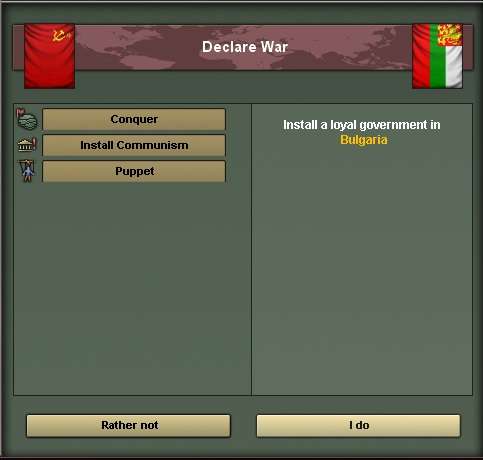
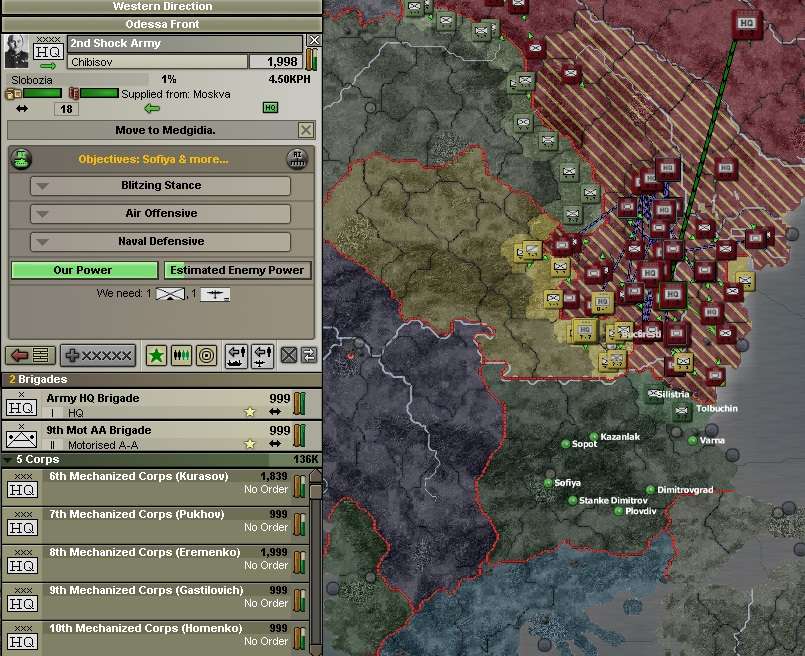
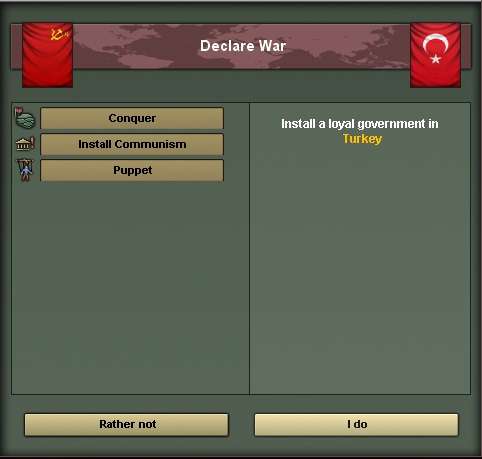
Sokolov nodded. Although he was increasingly involved in his own business as People’s Commissar for Justice, he remained an active-duty officer in the army, and thus was kept apprised of military planning, particularly as part of his duties on the SGO. “Ambitious plans, Comrade Stalin.”
Stalin smiled; not one trace of mirth was visible. “I quite agree, Comrade Sokolov. First, and I apologize for the delay, but let me be the first to congratulate you on being named a Marshal of the Soviet Union. You are long overdue for this promotion, and I can only assume that Marshals Tukhachevsky and Vatutin forgot to send in the paperwork earlier.”
Sokolov had expected, perhaps, a promotion to Colonel-General, but was absolutely stunned at the news he was being promoted all the way to Marshal. It was practically unheard of. “Thank you very much, Comrade Stalin!”
“You need not thank me; you have earned it with your tireless service to the Soviet Union. Marshal Sokolov, I would like you to take a more active interest in army affairs, as befits your rank. We do not want Comrade Vatutin becoming overworked, now do we?”
“No, Comrade Stalin. He is far too valuable.”
“Precisely, Marshal. Precisely.”
9 November 1939, Sevastopol
Vatutin was a little surprised and more than a little irritated when the order came, directly from Tukhachevsky’s office, requesting him to remain in Sevastopol to deal with a supply crisis while Admiral Kuznetsov was given overall command of the Turkish operation. Vatutin respected the Admiral, and indeed, the two of them had planned the invasion of Istanbul together.
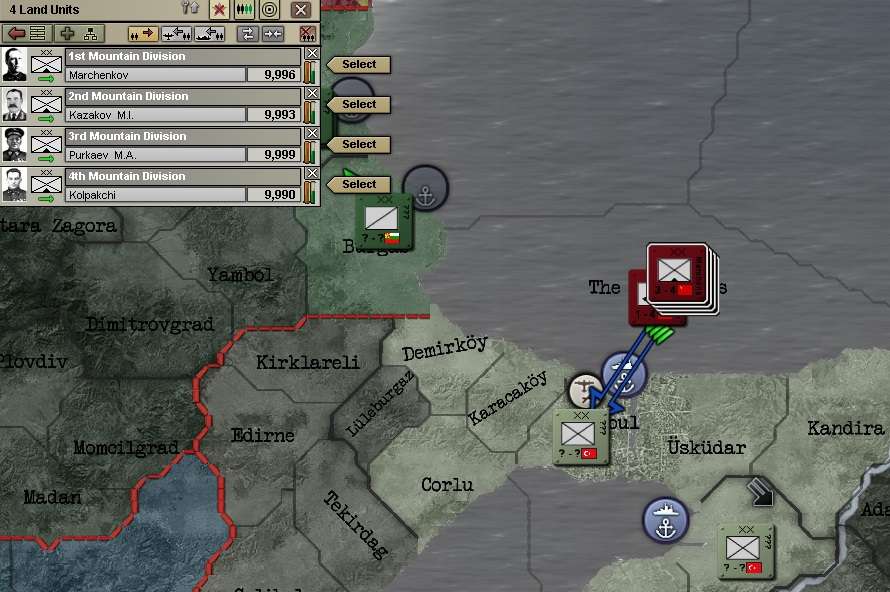
Still, he had hoped to lead his men into battle, as he had conducted the extensive training for the operation personally. He was also surprised to hear of Sokolov’s promotion. He did not doubt Sokolov’s courage, but questioned the need to create another new Marshal. Vatutin had argued that Sokolov deserved a promotion, true, but not all the way to Marshal. Tukhachevsky had actually recommended that Sokolov officially retire from the Army to devote all of his time to running his own Commissariat.
Vatutin shook his head. Something very, very strange was going on. Not, of course, that Vatutin didn’t have plenty to do. In his spare time, he was drawing up preliminary plans for the defense of the Soviet Union, should the Fascists move quickly enough.

The conquest of Denmark – a brilliant strategic maneuver – allowed Germany complete control over the access to the Baltic Sea.
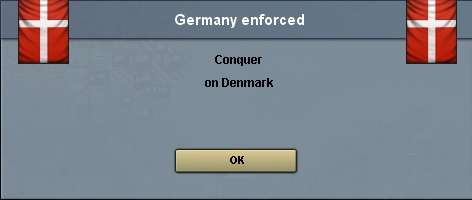
The British retaliated by occupying Iceland and Greenland, as a way to prevent a surprise invasion of the British Isles.
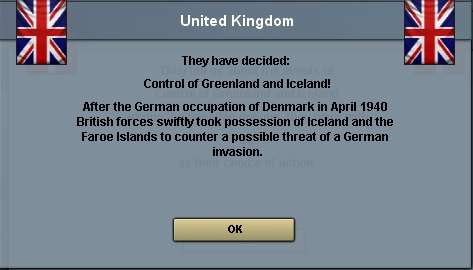
Vatutin, personally, didn’t think such an invasion likely, but that wasn’t his concern. What was his concern was the drastic supply shortages that appeared out of nowhere.

He’d had more than one panicked phone call from Zverev about supply distribution and production. Something had to be done, and soon, or the entire offensive would collapse.
23 November 1939, Istanbul
It had been the most difficult moment of Comrade Kamensky’s life, but it simply had to be done. Comrade Petrova agreed, which only made it worse: without assistance from another country, they could not guarantee the consistent flow of supplies necessary to give the army what it needed. Factories had been shifted to supply production, but that would take time. Something needed to happen in the short term.
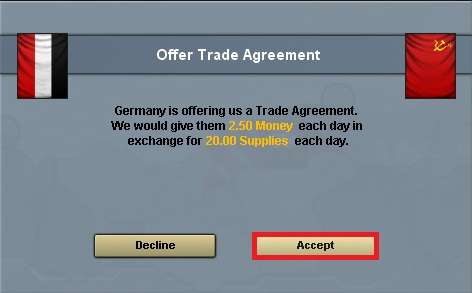
Trading with Germany was only slightly more palatable than trading with Japan, in her estimation, but there was no other alternative. Now, for the first time in years, she found herself personally negotiating with a “foreign” government to ensure that stream of supplies remained open.
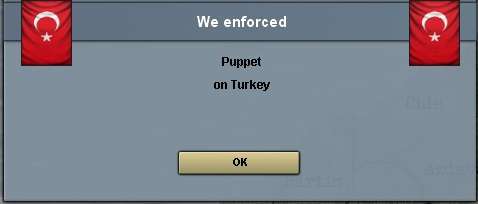
The conquest of Romania helped, of course, but it was really the liberation of Turkey from its imperialist regime that formally ended the crisis.

The Black Sea was open. Comrade Stalin personally made the radio address, proclaiming the straits of Constantinople (and that was the name he used) as “ours, finally.” He quickly added that by “ours” he meant “international Communism”, but everybody knew what he meant.
Kamensky, a fervent patriot, wished, for a split second, that Turkey had been formally annexed instead of merely “brought in line with Marxism-Leninism.” Her grandfather would have approved, no doubt. Yet this probably looked better to the international press. That mattered, she knew. It profoundly affected her ability to make trade negotiations.
The sound of trucks startled her, briefly. What was going on? She stopped a driver in the convoy to ask for information.
“We are off to Bulgaria, Comrade Kamensky, to bring the same socialist freedom to our brother Slavs that the Turk now enjoys.”

She merely nodded, let the driver pass, and returned to one more mind-numbing page of statistics.
1 January 1940, Moscow
Vatutin was furious. He knew that he shouldn’t care about matters as “bourgeois” as personal honor, but damn it, the Bulgarian maskirovka had been his idea, not Kuznetsov’s. Nikolai Gerasimovich had, to his credit, tried to decline the medal. Hero of the Soviet Union was something to be treasured, not handed over as part of a political game. But there it was: although it had been Vatutin that had created the plan sending the mountain troops pouring into Bulgaria, taking the enemy in the flank, it was Kuznetsov who got the reward as “field commander for Black Sea Operations.”
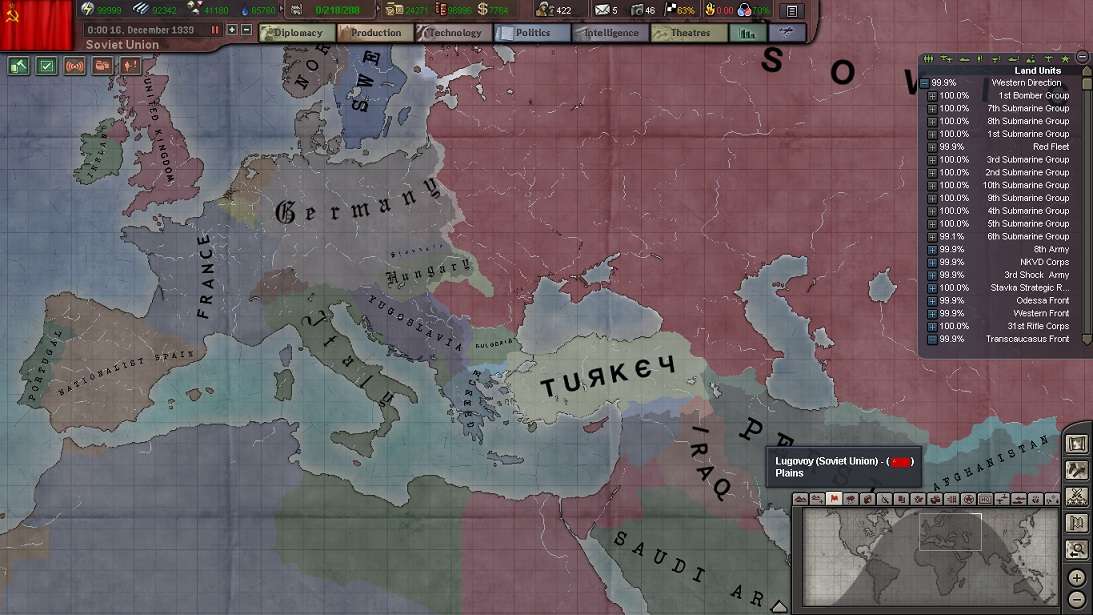
Vatutin’s “logistical wizardry” had been trumpeted by Stalin as well, but that was all. No acknowledgement of the weeks of careful planning that had gone into the operation. Just recognition for his supply work.
The defeat of Turkey and opening of the Black Sea only increased the number of recruits and amount of funding that the Red Navy received.
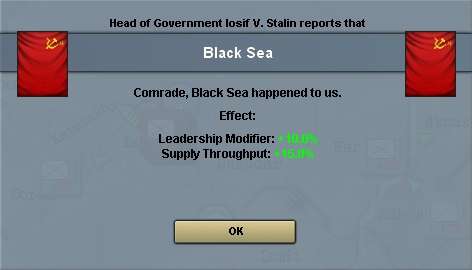
Tukhachevsky stood at rigid attention, saluting Kuznetsov, as the medal was pinned on his chest. Vatutin could not help but do the same. Their glances met, and they shared a wry smile. At least I’m not Vlassov, the smile said. The poor General was blamed for the supply shortage (and Vatutin had to admit that Vlassov had been less than stellar at the job) and given command over an NKVD division, so that he could put down the Finnish uprising.


Vatutin then looked at Marshal Sokolov. The Marshal, too, saluted. Vatutin winced as he saw Sokolov salute with his prosthetic hand, immediately feeling remorse that he had ever doubted Sokolov. He nodded, ever so slightly, and Sokolov returned it.
The last person Vatutin looked at was Stalin. Lieutenant and Major Dzhugashvili sat next to him, both looking decidedly uncomfortable. All of a sudden, Stalin turned to look directly at Vatutin. The ceremony itself had just concluded, and everybody was applauding. As Vatutin joined in, he heard the faintest whisper at his shoulder.
“Remember, thou art mortal.”
Vatutin turned to see Molotov directly behind him.
Two bonus pics I couldn’t quite work into the story.
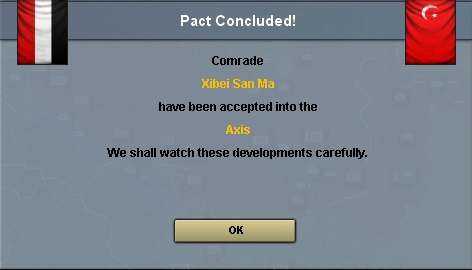
And
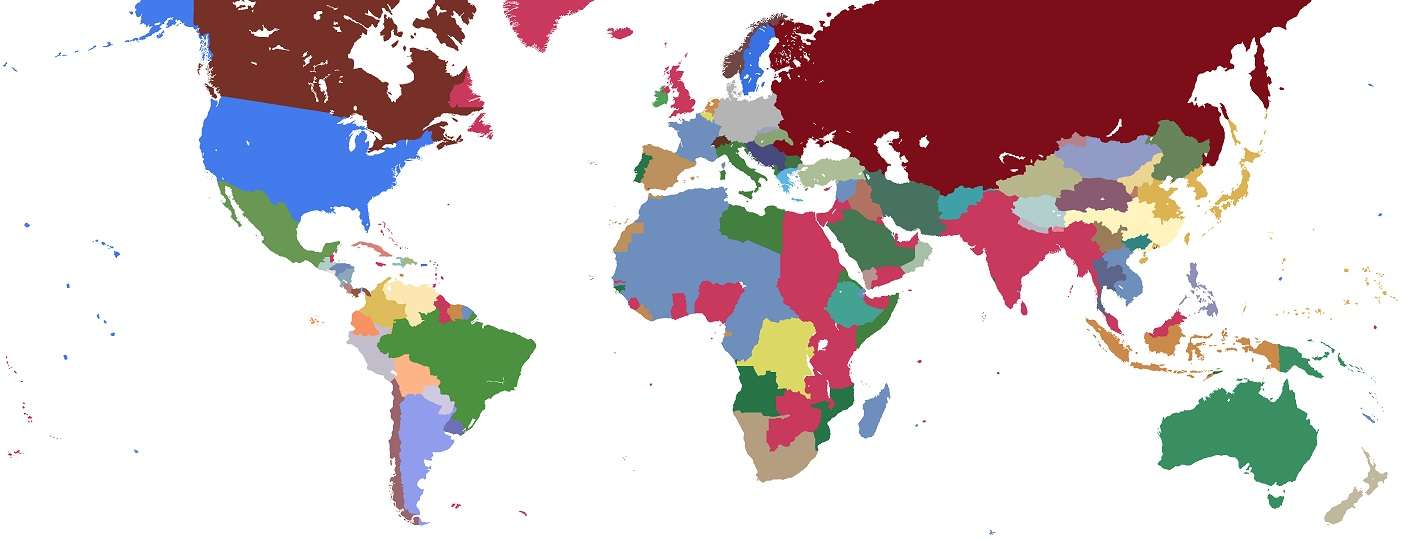
Hope you enjoyed it!
Urgh, Romania has given us an ugly border. We'll need to conquer everything west of it to make the map look neater.
we are pretty big, I suppose we can beat the crap out of germany with this force!
I certainly hope so!
Urgh, Romania has given us an ugly border. We'll need to conquer everything west of it to make the map look neater.
I will say this as often as I need to -- PDS games desperately need a "pretty border" CB.
Very nice update. As for the ugly borders, I have something in mind, but more of it in the admin thread.
well done great update. I can only say THANK GOD Stalin's son did not become a bomber pilot.
Very nice update. As for the ugly borders, I have something in mind, but more of it in the admin thread.
I eagerly await your resolution!
well done great update. I can only say THANK GOD Stalin's son did not become a bomber pilot.
He did. Did I not make that clear?
no you didn't. oh well I hope he doesn't get killedI eagerly await your resolution!
He did. Did I not make that clear?

Be glorious, our free Motherland
Bucharest,
The Romanian Soviet Socialist Republic
The Romanian SSR was still in the early stages of development come the spring of 1940 and the Red Army, much like the snow, was still thick on the ground. Konstantin Mikhailovich Cojocaru merely had to glance out his window to see a parade of soldiers and newly-appointed Military Police make sure that the people of Bucharest knew who the new boss was. King Michael had somewhat ironically fled to Hungary and the open arms (and ample bosom) of the pathetic "Admiral" Horthy while all his old foes came out of the woodwork. A Presidium of the SSR was hastily thrown together by the front commander and lo, Konstantin was in it. He was, in fact, Chairman of the Presidium and titular leader of the RSSR although the coveted post of General Secretary had slipped past him and into the fingers of that bastard Gheorghiu-Dej. He shook his head. No matter, there was business to attend to.
"I trust that the agreement is satisfactory, your Holiness?"
Patriarch Nicodim did not fail to miss the smirk or the heavy wash of sarcasm that accompanied his title and struggled to keep his composure. Fiddling with his beard he replied:
"The Patriarchate of Romania no more recognises Soviet authority in this nation than it recognises the existence of Baal of the Old Testament. The Red Army is not God, he who set down the Monarch to rule over the Romanian people and unless Christ himself alights upon the Kremlin in brotherhood, no amount of bribery can change that. And who have you even been negotiating with?"
Konstantin sat in thought for a moment and weighed the Patriarch's reply. Communism had received a mixed reception from the Orthodox Church in Romania as some embraced it out of a religious conviction stemming from the New Testament, some hardliner devouts and monarchists rejected it, and a great deal of pragmatics for whom their ecclesiastical robes were only a means of advancement agreed to work with the authorities. Unfortunately the Patriarch himself had always been close to the Royal Family and offers of dissolving the remnants of the Uniate Church and handing the assets to the Orthodox would apparently not shake his loyalty. He lit a cigarette and blew smoke into the old man's face, sending him into a fit of coughing.
"You know, Nicodim," no use for formalities now he thought "we have certain ways of dealing with those who act against the interests of the Revolution... perhaps you may reconsider?"
Now furious, Nicodim stood. The white robes and headdress of the Patriarch of All Romania looked out of place in the spartan temporary offices of the Presidium but he wore them with a dignity befitting their office. "I will never submit to threats and neither will the Church. You can go to hell, and I'm sure you will."
And with that, he stormed out.
Konstantin sighed. He hated having to work with such a bourgeois institution as the Church but knew that if he was able to turn it towards Soviet end then it would be that much easier to spread the ideals of the Revolution. The sacrifices one made... he picked up the phone and made a call. The Metropolitan of Iaşi had for a long time been in the pocket of the Communists and was famed for having hidden Gheorghiu-Dej in his parish after the latter had escaped from internment. It was time to reward that loyalty.
Breaking News: Patriarch Nicodim passes away, Comrade Metropolitan Justinian Marina of Iaşi elected as newest Patriarch. Greek-Catholics publically reconcile with the Church!
Female patriarch? Lord, I should hope not.Female Patriarch ? O tempora o mores !!!
Welcome back in the AAR.
And thanks kindly.
Female patriarch? Lord, I should hope not.
And thanks kindly.
Oh ! I was confused. I thought Patriarch Justinian was a title (re-inventing the post after the revolution) and Marina is a female name (at least in Greek). But now I realised that Justinian is a first name.
I would have been more than blasphemy to put a woman in the Patriarch throne...
Chapter 11: Infamy or opportunity?
3 January 1940, Moscow
Even in the midst of war, the people of Moscow still celebrated New Year’s in fine fashion. As a symbol of his solidarity with the people, Stalin chose to remain in the Soviet capital rather than depart for his dacha on the Black Sea. After all, Yugoslavia was in excellent hands.
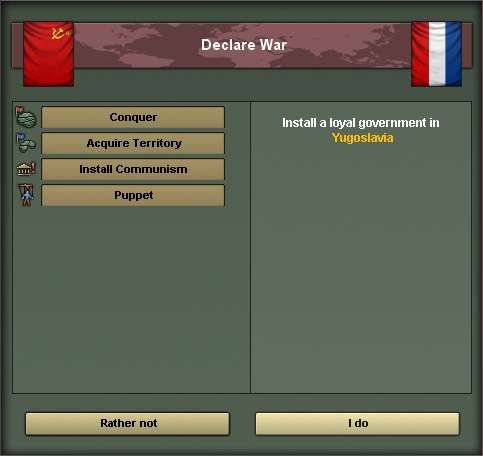
As Stalin lifted the glass of vodka to take a sip, all of his telegraphs and telephones went off at once. “What is the meaning of this nonsense?!”
People’s Commissar for Foreign Affairs Anastasia Petrova burst into the room. “Comrade General Secretary, the bastards have done it again!”
Stalin, for the first time she could remember, was at a loss for words. “I’m sorry, Comrade?”
“The Japanese!”
“What have they done?”
“It’s 1905 all over again!”
Stalin took a moment, set down his glass very carefully, and trained his full concentration on Petrova. “What would you remember of 1905, child? I think, perhaps, you should have a seat.”
Petrova, realizing she might leave Stalin’s office with her skin intact, did as ordered. “Comrade General Secretary, the Japanese have attacked!”
“Where? Vladivostok?”
Petrova was about to answer, when one of her clerks rushed into the room and whispered urgently in her ear. She cocked her head in confusion at the clerk. “They attacked whom?”
Stalin was showing visible signs of losing his temper, but he choked back his rage. “Yes, Comrade Petrova, perhaps you should let your subordinate explain, if you cannot.”
Petrova’s fear melted away, replaced with a look of triumph. “I am sorry, Comrade General Secretary. The information I initially received was garbled. The Japanese have attacked the United States, not us.”

Stalin pondered the information. “Thank you, Comrade Petrova. You may return to your office; please keep me informed as the situation further develops.”
21 January 1940, Sofia, Bulgaria
Marshal Tukhachevsky studied the map of the Yugoslav front very carefully.
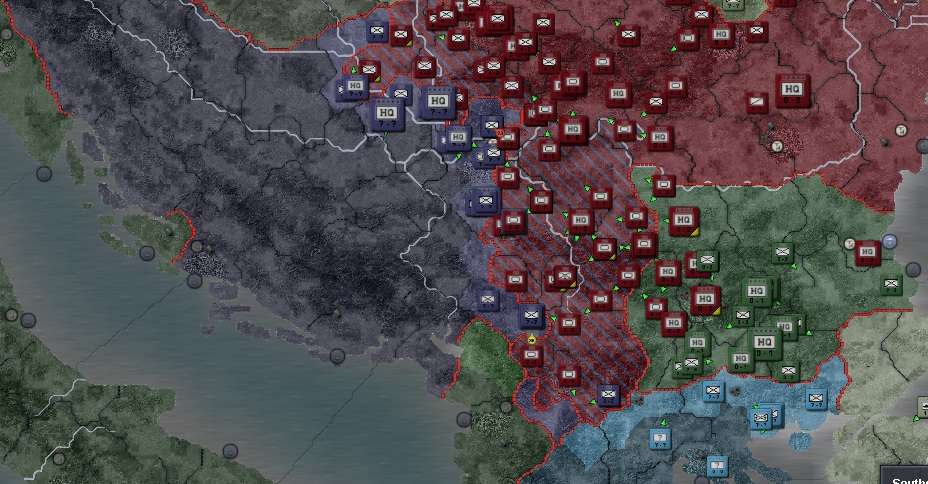
“Thank you, Comrade Captain. You may go.”
The Captain saluted and left. Tukhachevsky returned to the map. So, everything is going well so far. Vatutin, you’ve done it again. When our naval invasion hits them in the rear, Comrade Tito will have himself a lovely little playground once again.
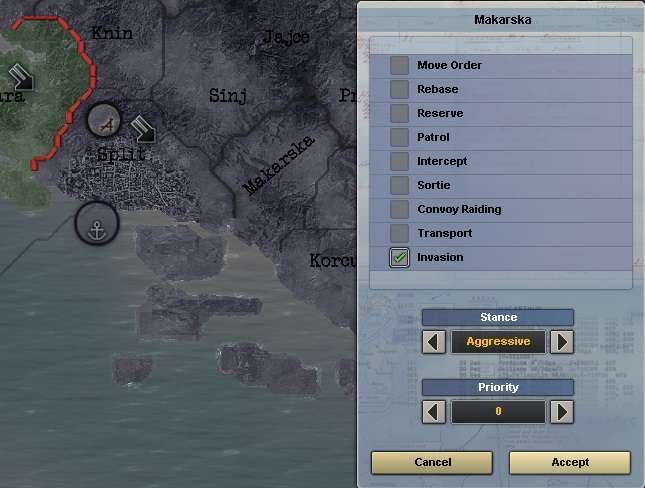
Tukhachevsky’s phone rang. “Yes?”
“Comrade Marshal, it is Vatutin.”
“Comrade Marshal! I was just thinking about your plan for Yugoslavia. Brilliant work!”
“Thank you, Comrade, but it is not Yugoslavia I am calling about.”
Tukhachevsky was puzzled, and then it gradually dawned on him. “The Germans? What are they doing?”
“That’s just it, Comrade Marshal: nothing.”
Tukhachevsky was even more confused. “The Japanese activated their alliance with the Germans, did they not?”
“Correct, Comrade Marshal.”
“And?”
“Not one fascist soldier has left their camp.”
“I find that hard to believe, Comrade Marshal.”
“As did I, but the Germans seem content to wait quietly. The Hungarians answered the call, too, and they’ve been nervously watching our movements in Yugoslavia.”
Tukhachevsky smiled wolfishly. “As well they might, Comrade Vatutin. Still, this does pose an interesting question. Is it time for Plokhoy Volk, do you think?”
“Not yet, Comrade Marshal. I think Comrade Stalin wants to see what the Germans do.”
“Prudent. Move forward with Persia at your convenience. Oh! One last thing.”
“Yes, Comrade Marshal?”
“I would like you to investigate the possibility of using some of our combat veterans in new divisions to serve as our vanguard into Germany.”
“As you command.”
“Very well. Goodbye, Comrade Vatutin.”
1 March 1940, Belgrade, Yugoslavia
Marshal Tukhachevsky, who always preferred to be as far forward as possible, was studying the deployments of the Yugoslav army.
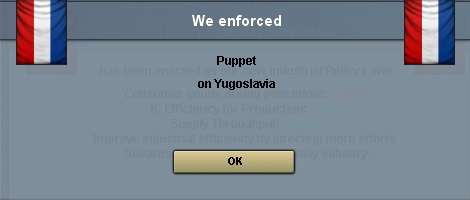
If the Hungarians got proactive, they might try to swing to the south. Vatutin was back in Moscow, reviewing the progress in Persia.

Tukhachevsky was a little surprise at how quickly Persian forces had gone into Soviet Central Asia, but the idea was that the Persians would overextend themselves, while the Soviet Mountain Corps pushed east to Tabriz and Tehran.
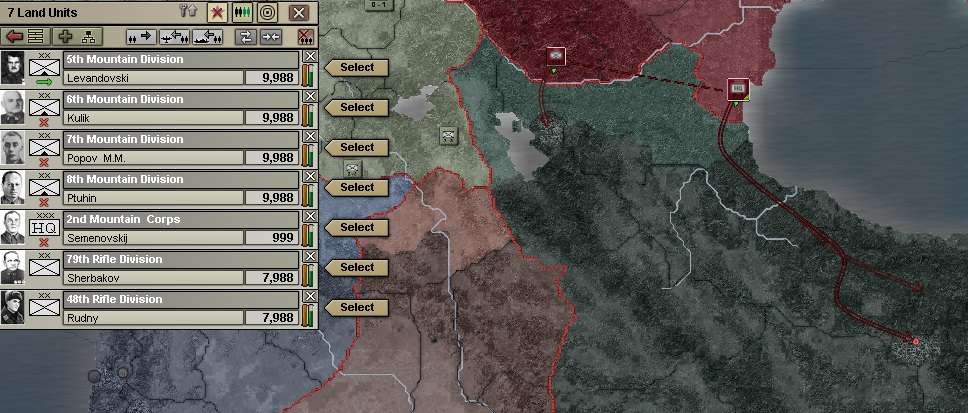
Tabriz had already fallen, but the distance between the Soviet border and Tehran was proving a formidable opponent – more so than the Persian troops.
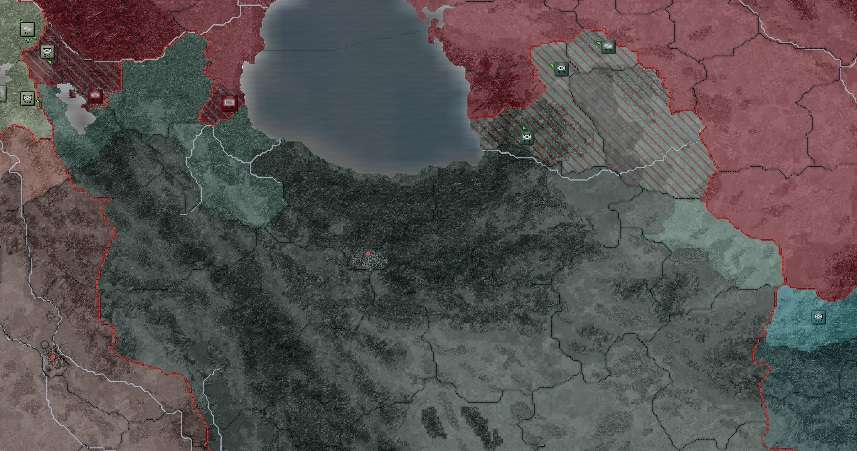
Tukhachevsky wasn’t worried. No, he had a bigger problem. Major Dzugashvili had been formally assigned to his staff. The lad was a perfectly capable officer, and he welcomed the Major’s input, but the real reason he was there was because Stalin thought a war with Germany was imminent. It wasn’t that the Marshal didn’t want the war, or that he didn’t even think that the time was right: it was that every opponent the Red Army had faced up to this point was, in Tukhachevsky’s opinion, less worthy than a single division of the Wehrmacht. And if the reports coming in were true – that Germany wasn’t even attacking Belgium – that could only mean they were bracing for an attack in the East.
Either way, it would prove the ultimate challenge of Tukhachevsky’s career.
I certainly didn't see that coming! Japanese must have had an itchy trigger finger.
The giant is awake two years ahead of schedule? Germany isn't moving West? This is certainly an unforeseen turn of events. I hope we can dance fast enough to keep up with the changing tune.
I panicked as I was reading the update, I had to scroll down to see what happened. After all this extremely careful planning, and discussions for weeks to see Japan attack Vladivostok ? The next update would take more than a year... Luckily, it was only the yanks who got attacked xD
My theory is that the Soviet activities in bringing the Revolution to the peace loving people of Finland, Turkey and the Balkans lowered the mode of neutrality of the United States to the point that they became rather antsy whilst the Japanese didn't have anything other options given they already got what they wanted in China and they could not unilaterally attack the Soviet Union whilst Germany had the Petrova-Ribbentrop Pact.
Or it could be bunnies....
If the save game could be loaded, I should be able to prepare plans pretty quickly as I don't expect that there will be much to do in the March-April turn since all of the staging areas for Operation Plokhoy Volk have been secured.
Or it could be bunnies....
If the save game could be loaded, I should be able to prepare plans pretty quickly as I don't expect that there will be much to do in the March-April turn since all of the staging areas for Operation Plokhoy Volk have been secured.

